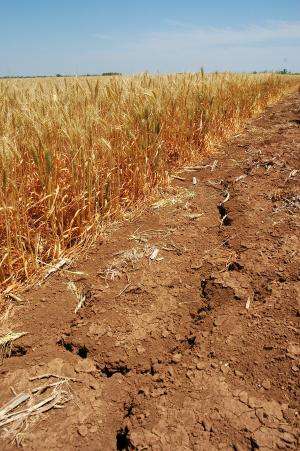Study examines climate change effects on crop mix shift, transportation

(Phys.org) —Drought conditions in Texas and throughout the U.S. the past decade have not only caused crops to fail, but farmers have had to alter the mix of commodities planted to better adapt to a changing environment.
That could potentially lead to changes in the way grains are transported, according to researchers.
In Texas, traditional portfolios of crops grown are beginning to experience change as a result of the environment, swings in prices paid for individual crops and the supply and demand outlook.
"Cropping shifts have occurred in Texas with additional land moving out of crops into grazing use and possible northward shifts in locations of cotton and sorghum," said Dr. Bruce McCarl, a Texas A&M AgriLife Research Senior Faculty Fellow and Distinguished Professor of Agricultural Economics at Texas A&M University.
McCarl recently co-authored, "Effects of Climate Change on U.S. Grain Transport," which was published recently in the journal, Nature Climate Change.
"We have also seen a corn acreage increase mainly due to bioenergy demands and high market prices," he said. "Such developments can be partially linked to climate change issues, given the expressed goals of the renewable fuel standards involved with greenhouse gas emissions reduction."
Crop mix shift is often a consequence of climate change and such shifts may change the demands grain places on transport systems, according to the study. The research evaluated corn and soybean growing regions such as the Corn Belt, Great Plains and the Lake states.
The study investigated the effects of climate change and how it could decrease Great Lakes water levels, shorten the duration of ice cover in the winter, and alter grain supplies in grain-exporting countries.
McCarl and researchers found that crop production effects "stimulate changes in crop mixes and crop location, and that this causes altered supply and in turn less barge usage as the subsequent supply is less proximate to the river with more grain going east and west by rail."
Crop mix shifts lessen the role of Lower Mississippi River ports, though increases Pacific Northwest ports, Great Lakes and Atlantic ports. The study also found there was a shift in barge to rail and truck transport.
Another outcome of the study found one possible consequence of climate change would be reduced grain production in many world regions. The Ukrain, Serbia, Moldova and Kazakhstan would likely be affected and compete with the Great Lakes ports for exports. Between 30 and 50 percent reductions in exports would result from those countries.
More information: www.nature.com/nclimate/journa … ll/nclimate1892.html
Journal information: Nature Climate Change
Provided by Texas A&M University

















